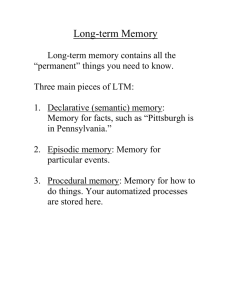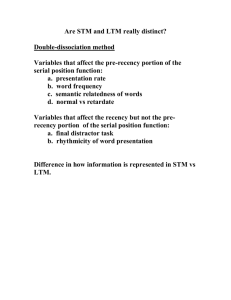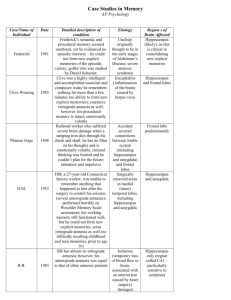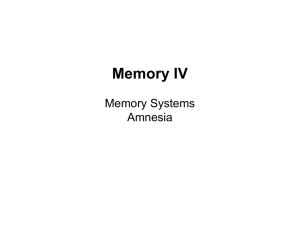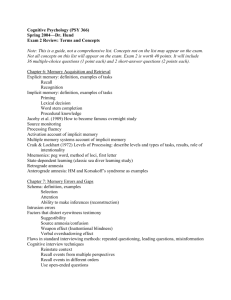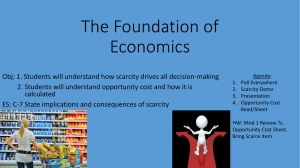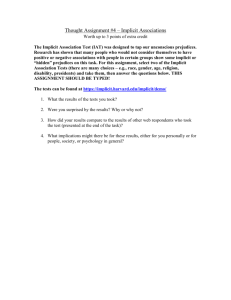Learning and Memory
advertisement
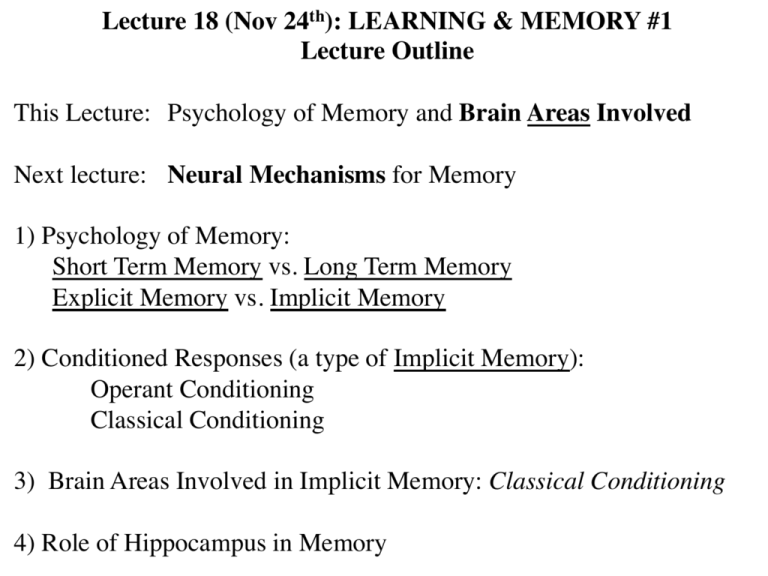
Lecture 18 (Nov 24th): LEARNING & MEMORY #1 Lecture Outline This Lecture: Psychology of Memory and Brain Areas Involved Next lecture: Neural Mechanisms for Memory 1) Psychology of Memory: Short Term Memory vs. Long Term Memory Explicit Memory vs. Implicit Memory 2) Conditioned Responses (a type of Implicit Memory): Operant Conditioning Classical Conditioning 3) Brain Areas Involved in Implicit Memory: Classical Conditioning 4) Role of Hippocampus in Memory PSYCHOLOGY of Memory Some Memory Terms: Retention: maintaining a memory Recall: to bring back to mind, to retrieve Recognize: to perceive something as previously known, it is “familiar” Short Term Memory (STM) vs. Long Term Memory (LTM) STM: memory for things that just happened limited storage 7 items (+/- 2) LTM: memory for things that do not currently occupy your attention; they must be recalled or recognized Permanent memories require: STM -> consolidated -> LTM How best to consolidate STM -> LTM? i.e., how best to retain? 1) You need GLUCOSE (brain’s energy source) a) get it from food b) get it from Adrenaline and Cortisol (remember from last lecture?) In response to stress,… Adrenaline is released from Adrenal Medulla Cortisol is released from the Adrenal Cortex … which results in Glycogen -> Glucose (also, happens when aroused in general, from an emotional/meaningful event) Do not study when you’re feeling bored! Do not study in a panic! So, it’s ok (even good) to be a little stressed! Maybe a little nervousness just means we care! How best to consolidate STM -> LTM (con’t)? 2) Study From Different Angles. And, make links with other known things. (It’s easier to recall a story as a whole rather than a bunch of unrelated facts). Don’t “commit to memory”, do “commit to understanding” 3) Sleep / Alcohol / Midazolam Stops new memories from being formed, which would otherwise interfere with the memory consolidation of items just learned LTM: Explicit Memory vs. Implicit Memory Explicit: memory for events or facts “episodic” memory (i.e., events), “remember” “declarative” (i.e., facts that can be stated), “know” Implicit: memory that does not require memory of specific events or facts, yet affects our behavior 1) Learned Motor Skills (“procedural memory” or “motor memory”) Mirror Drawing Tower of Hanoi LTM: Explicit Memory vs. Implicit Memory Explicit: memory for events or facts (sometimes called “semantic”) “episodic” memory (i.e., events), “remember” “declarative” (i.e., facts that can be stated), “know” Implicit: memory that does not require recollection of specific events or facts, yet affects our behavior 1) Learned Motor Skills (“procedural memory”) 2) Priming Effects A) Word priming: word or non-word? Test = “doctor” vs. “pwnig” Prime = “nurse” vs. “car” (… the prime is implicitly put in memory) B) Subliminal Advertising: ALL OVER THE PLACE! LTM: Explicit Memory vs. Implicit Memory Explicit: memory for events or facts (sometimes called “semantic”) “episodic” memory (i.e., events), “remember” “declarative” (i.e., facts that can be stated), “know” Implicit: memory that does not require recollection of specific events or facts, yet affects our behavior 1) Learned Motor Skills (“procedural memory”) 2) Priming Effects A) Word priming: word or non-word? Test = “doctor” vs. “pwnig” Prime = “nurse” vs. “car” (… the prime is implicitly put in memory) B) Subliminal Advertising: ALL OVER THE PLACE! 3) Conditioned Responses (next slide) Conditioned Responses A) Operant Conditioning B) Classical Conditioning Conditioned Responses A) Operant Conditioning: 1) Reward (or “Reinforcement”)-> increase the likelihood of behavior X i) positive: “if you do X, I’ll give you candy” ii) negative: “if you do X, I’ll stop hitting you” 2) Punishment -> decrease the likelihood of behavior Y i) positive: “if you do Y, I’ll hit you” ii) negative: “if you do Y, I’ll stop giving you candy” “Carrot and Stick” Conditioned Responses (One type of Implicit Memory) A) Operant Conditioning: “If you do this, I'll do that” B) Classical Conditioning: uses “natural”, automatic response “When I do this, you'll do that” Developed by Ivan Pavlov, Nobel Prize 1904 After During Before Classical Conditioning" Unconditioned Stimulus (UCS) Neutral Stimulus Conditioned Stimulus (CS) Unconditioned Response (UCR) Unconditioned Stimulus (UCS) Neutral Stimulus No Conditioned Response Unconditioned Response (UCR) Conditioned Response (CR) Donald Hebb (1950s): Learning/Training is an increase in connectivity between neurons as a result of simultaneous activity in those neurons (“Hebbian” Mechanisms) (more next lecture) So, let’s use Hebbian Mechanisms to explain Pavlov’s Dog! Training" Strong connection" CR" Classical Conditioning" Role of the Hippocampus in Memory Involved in Implicit or Explicit? We’ll come back to…. " Amygdala Amygdala " Human Hippocampal Damage -> Memory Loss (“Amnesia”) First, let’s define different types of Amnesia - Retrograde Amnesia: loss of events prior to injury - Anterograde Amnesia: inability to create new memories after the injury The story of patient H.M. (1926 – 2008) (seizure sufferer): Hippocampus (and Amygdala) Removed Symptoms after Hippocampus Damage (H.M. and others): - Severe Anterograde amnesia, but only slight Retrograde amnesia (1-3 years before) - Anterograde Amnesia for LTM, not STM - Anterograde Amnesia for explicit LTM, but not implicit LTM (e.g., mirror drawing) Ok, so ……Role of the Hippocampus Mirror Drawing - Not where memories are stored (since only mild retrograde amnesia) - Consolidates STM -> LTM - Consolidates Explicit, but not Implicit, LTM Hmmmm…. But why is there ANY retrograde amnesia after hippocampal damage? (and true in head trauma cases too) But for SPATIAL memory in RATS (and maybe humans), it IS where memories are formed and stored. The Role of the Hippocampus in Spatial Learning (Rats) Water Maze" Task" First, what is Spatial Memory? Explicit? Implicit? Hippocampal Lesions in Rats: - a permanent loss of the learned water maze (Hippocampus necessary for retention, i.e., it is where the spatial memory is “stored”) - loss in the ability to learn new water maze (Hippocampus necessary to form new spatial memories) Other Evidence that Rat Hippocampus Involved in Spatial Learning “Place Cells” in Hippocampus (O’Keefe & Dostrovsky, 1971) have spatial receptive fields (based on sensory cues in room) NEXT LECTURE: NEURAL MECHANISMS: Long Term Potentiation Long Term Depression "
